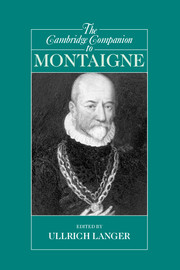Book contents
- Frontmatter
- 1 Introduction
- 2 Montaigne’s political and religious context
- 3 Montaigne’s legacy
- 4 Montaigne and antiquity
- 5 The Essays and the New World
- 6 Justice and the lawlaw: on the reverse side of the Essays
- 7 Montaigne and the notion of prudence
- 8 Montaigne and the truth of the schools
- 9 The investigation of nature
- 10 Montaigne and skepticism
- 11 Montaigne on moral philosophy and the good life
- Bibliography
- Index
3 - Montaigne’s legacy
Published online by Cambridge University Press: 28 May 2006
- Frontmatter
- 1 Introduction
- 2 Montaigne’s political and religious context
- 3 Montaigne’s legacy
- 4 Montaigne and antiquity
- 5 The Essays and the New World
- 6 Justice and the lawlaw: on the reverse side of the Essays
- 7 Montaigne and the notion of prudence
- 8 Montaigne and the truth of the schools
- 9 The investigation of nature
- 10 Montaigne and skepticism
- 11 Montaigne on moral philosophy and the good life
- Bibliography
- Index
Summary
A legacy is something that is given by an ancestor or predecessor and handed down to future generations. A philosophical legacy is normally held by philosophers to consist of a set of questions and concepts that claim attention on their own merit. The origins and tradition of the gift have no effect on its intrinsic significance and authority. Montaigne bequeaths questions about what man can know, together with concepts of selfhood and experience. Philosophers from Descartes and Pascal to Husserl and Merleau-Ponty designate themselves heirs by freely assessing the philosophical merit of the bequest and moving the discussion on unhampered by any obligations to the legator. Their own authority, in turn, does not depend on the origins of their philosophical questions and concepts.
Someone who thought that the authority of a legacy with its heirs is or should be conditioned by the origins of the philosophical gift, by the moral character of its donor or author, by the social tradition identifying it as a source of guidance, would be accused of committing a fallacy. Yet the majority of Montaigne’s contemporaries thought in something like this way. When Montaigne received the philosophical legacy of Raymond Sebond, his freedom of response was significantly conditioned by the circumstances in which he received it from his father, by the fact that court ladies were seeking guidance from the work. But, as we shall see at the end of this chapter, it was precisely the freedom to judge others’ philosophical legacies on their own merits that became Montaigne’s own legacy. To put this another way, he retrospectively changed the character of the ancient philosophical auctoritates (authorities), and the spirit in which they gave their thoughts to posterity. After Montaigne, they became more doubtful, more free-spirited, more open.
- Type
- Chapter
- Information
- The Cambridge Companion to Montaigne , pp. 27 - 52Publisher: Cambridge University PressPrint publication year: 2005
- 3
- Cited by

